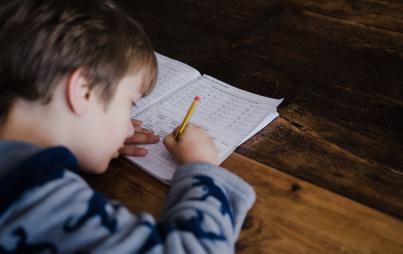
At a time when Americans are encouraged to reflect on their blessings, focusing on how to teach your children about gratitude is essential.
Though your attention may be hyperfocused on how you’re going to baste the turkey and wrangle together your extended family for one giant dinner-time selfie, the sentiment behind Thanksgiving extends far beyond the menu. At a time when Americans are encouraged to reflect on their blessings, teaching gratitude to your children is essential.
Not only does a gracious attitude help them understand their privileges during the holiday season, but it can create a more positive mindset throughout their lives.
Here, a psychologist shares the best approach for teaching your children how to live with the spirit of Thanksgiving year-round, not just when they mind their p’s and q’s to get an extra slice of pecan pie:
1. Why gratitude is an important lesson.
Unlike generations before them, your child’s worldview is influenced by a culture that’s rich in instant-gratification. With so many luxuries a quick smartphone-tap away, it can be difficult for kids to realize their experience is gravely different than those of children in other parts of the world — or even their hometown.
On the other hand, if your child is always comparing their birthday gifts to the wrapped-up wonders your wealthy next-door neighbor can give their family, explaining gratefulness can help them acknowledge what they do have instead of focusing on what they don’t. “Teaching your child about gratitude fosters development of mindfulness because kids have to reflect on what matters and what they appreciate," clinical psychologist Stephanie O’Leary explains. "All of this leads to increased resilience and the ability to find the silver lining in situations.”
2. When should you start teaching gratitude?
According to Dr. O’Leary, it’s never too early — or too late — to enrich your child’s development with thankfulness. Even if you have a baby who might not be able to share the smashed peas he or she loves when you go around the Thanksgiving table, Dr. O’Leary says minding your manners and words can affect your infant or toddler’s brain. “Before your baby is verbal, you can take time to reflect on what you are grateful for and make a point to express gratitude throughout the day. Infants and young children watch parents closely and soak up every word and action before trying to replicate and copy them,” she explains.
For your school-aged kiddo who can communicate, Dr. O’Leary notes how acknowledging the differences between wanting, needing, and being grateful can help shift their attitude. By pointing out the phrases they’re using and suggesting alternatives that express gratitude, you’re beginning to illustrate the importance of a thoughtful heart. “‘I want’ or ‘I need’ statements inherently convey the message that your child is incomplete and unsatisfied,” Dr. O'Leary explains. "‘But, ‘I'm grateful’ conveys a sense of appreciation and fulfillment. By teaching your child about gratitude you provide him or her with a powerful life skill that can improve mood and foster confidence.”
3. Incorporate gratitude practice into your daily routine.
Though passing the wishbone around the dinner table to reveal what you’re thankful for might be a time-honored tradition, Dr. O’Leary says gratitude must be part of a child’s everyday life to make a lasting impact. This means much like their piano lessons, soccer matches, and poetry-writing courses, practice makes permanence. “Upon waking up and going to bed ask your child what he or she is grateful for and share your own examples as well," Dr. O'Leary suggests. "Or, pause before family meals to express gratitude for the food you are about to enjoy is another way to teach your child the importance of appreciating what he or she has.”
You Might Also Like: I HATE YOU AND I HATE IT HERE! (A Story Of Just How Much Kids Hate Change)
4. Say what you’re thankful for each day.
Even if it’s difficult for you to run a brush through your hair and remember to turn off the coffee pot on the mad rush to school each day, Dr. O’Leary suggests selecting a time each day where you can share what you’re thankful for. Not only will your children likely follow along if you make it a fun car game, but you shine by example. “Remember that your children are watching you even when they are much older and seem to be actively ignoring everything you do or say," Dr. O'Leary shares. "Expressing gratitude toward and in front of your children is a powerful way to instill this value,” she shares.
And hey, if you didn’t get much sleep the night before because you had to finish a last-minute presentation for work (#wefeelya), Dr. O’Leary says faking it won’t create the enthusiasm in your children you’re aiming to encourage. “Children will likely see through any phony attempts, so instead, check in with yourself at least once a day and find something you do truly appreciate and then share it with your child,” she says. Simple statements like, "I'm grateful we have heat on this cold night," or "I'm grateful for the chance to read a book together" will go a long way, she adds.
5. Choose your timing wisely.
Let’s be real: the sugar high of the holiday season is something even the best-behaved and calmest children can’t quite resist. From cookies and candies that stimulate their sweet tooth to the influx of new toys and games that ignite their rambunctious side, having a serious conversation in the midst of chaos isn’t the most effective tactic. Instead, Dr. O'Leary says to find a quiet time when your kiddos can give you as much of their undivided attention as they can wiggle through. “Initial conversation can include games, such as name five things you are grateful for that are in this room. You can change the focus a bit by altering the topic such as naming things that are outdoors, invisible, or that start with a certain letter,” she suggests. “This will get the ball rolling and will help your child feel empowered - rather than judged - by the idea of gratitude.”
6. Gift books that focus on gratitude.
If your little ones are still at the age when storytime is their favorite way to end the evening, take advantage of their growing imaginations. This can be a beneficial way to assist your children’s understanding of gratitude and take it more seriously. “Reading is a great way to convey information, and most kids enjoy reading books over and again, so opportunities for practice and repetition are built in,” Dr. O'Leary says. One of Dr. O’Leary’s favorite books that touches on gratitude is Zen Shorts by Jon J. Muth. Not only is it beautifully illustrated, but it can hold the attention of older kids.








